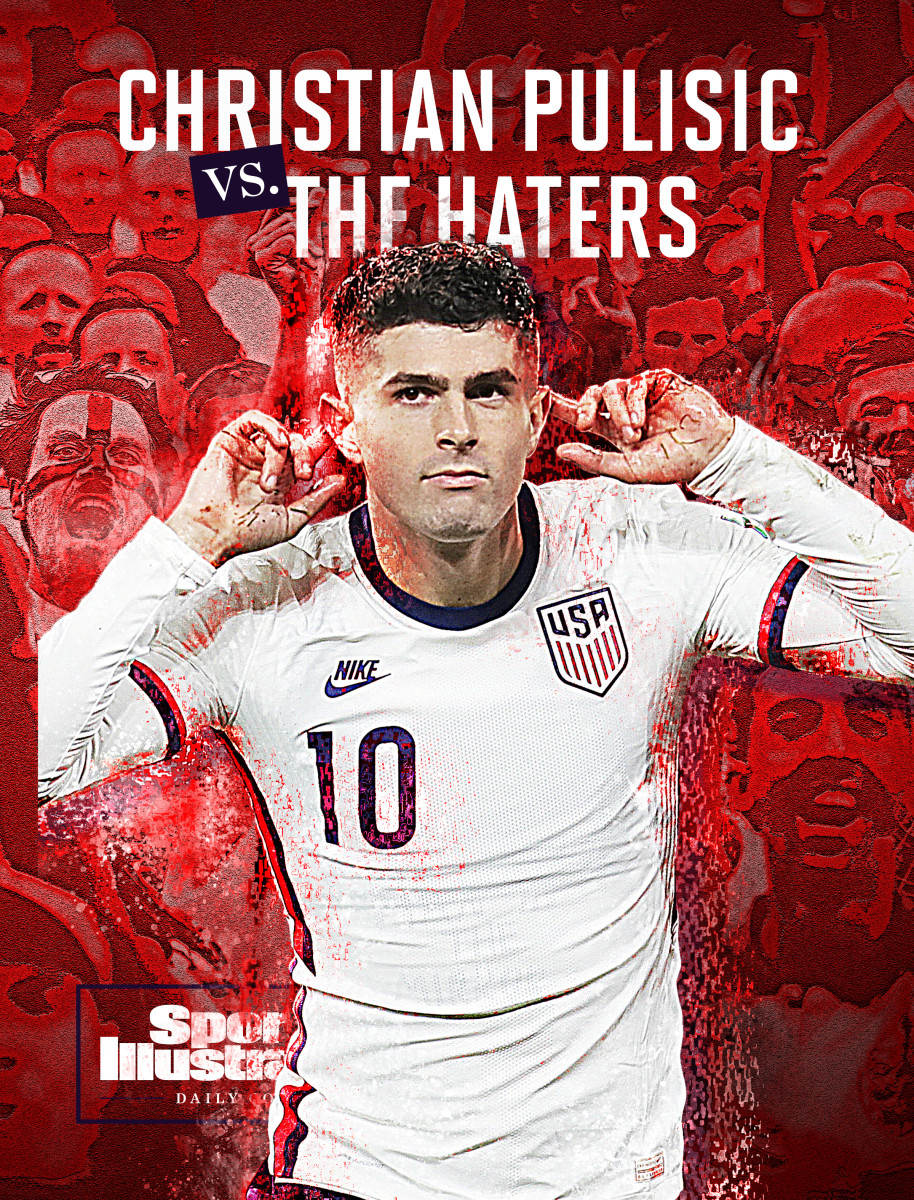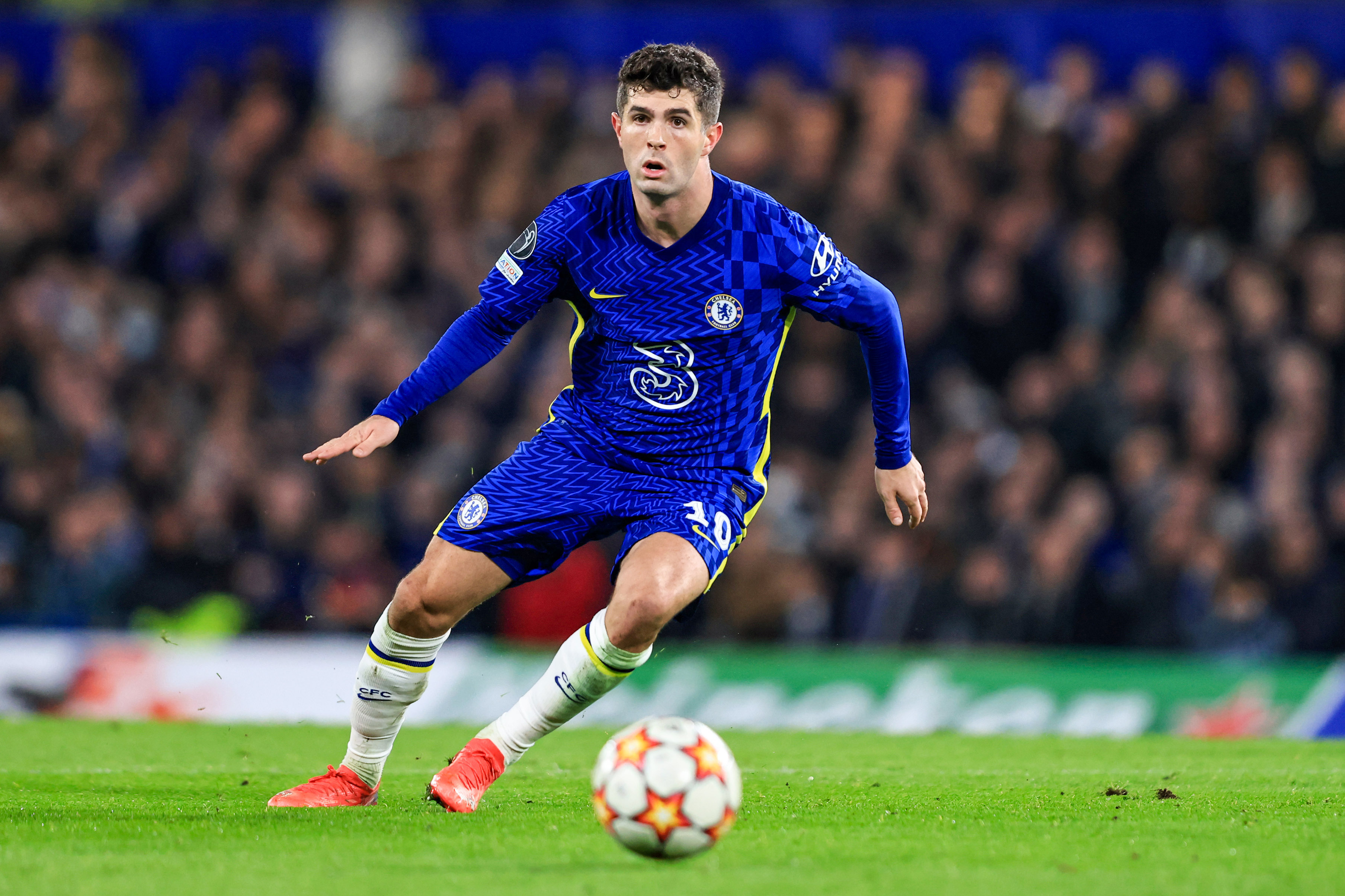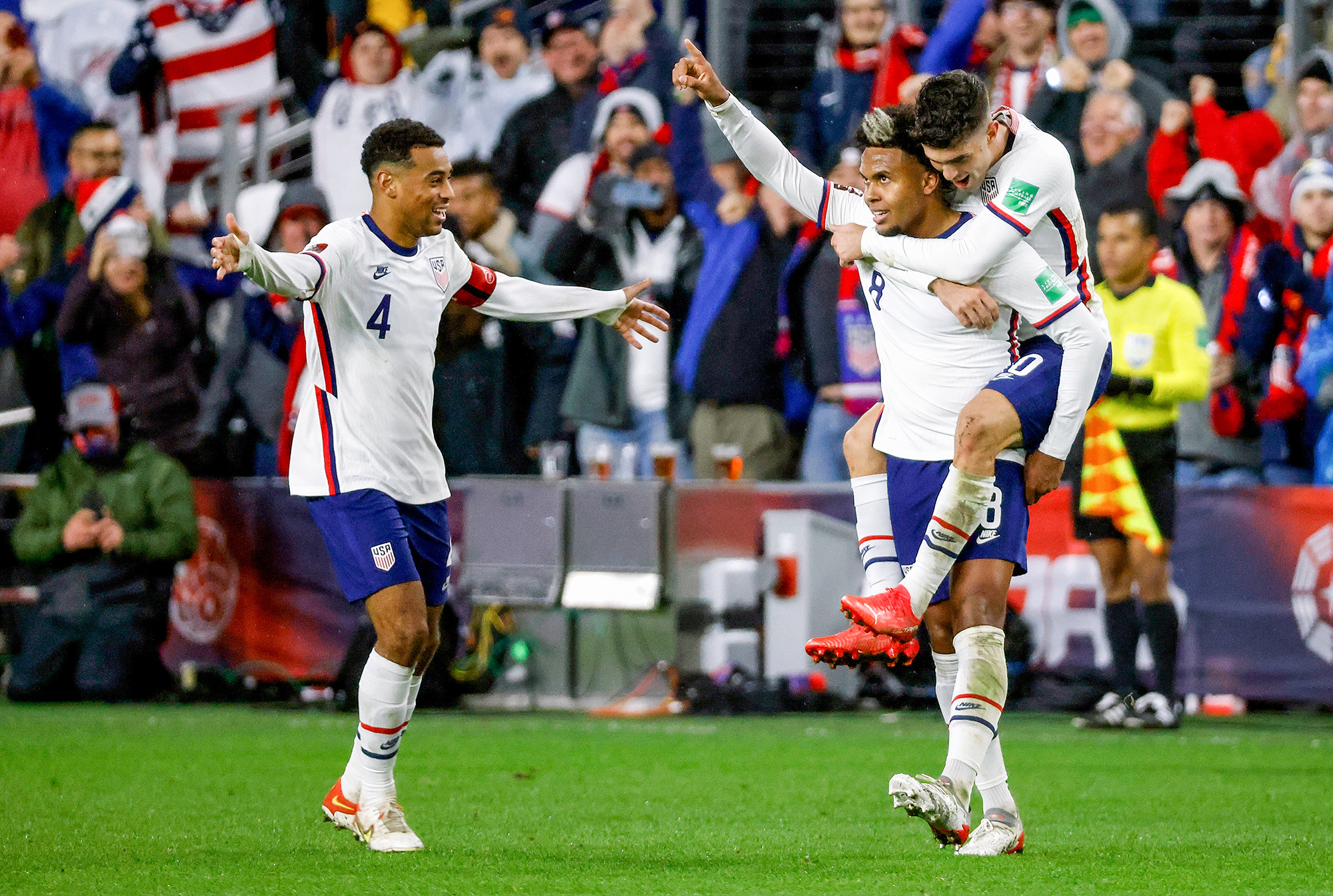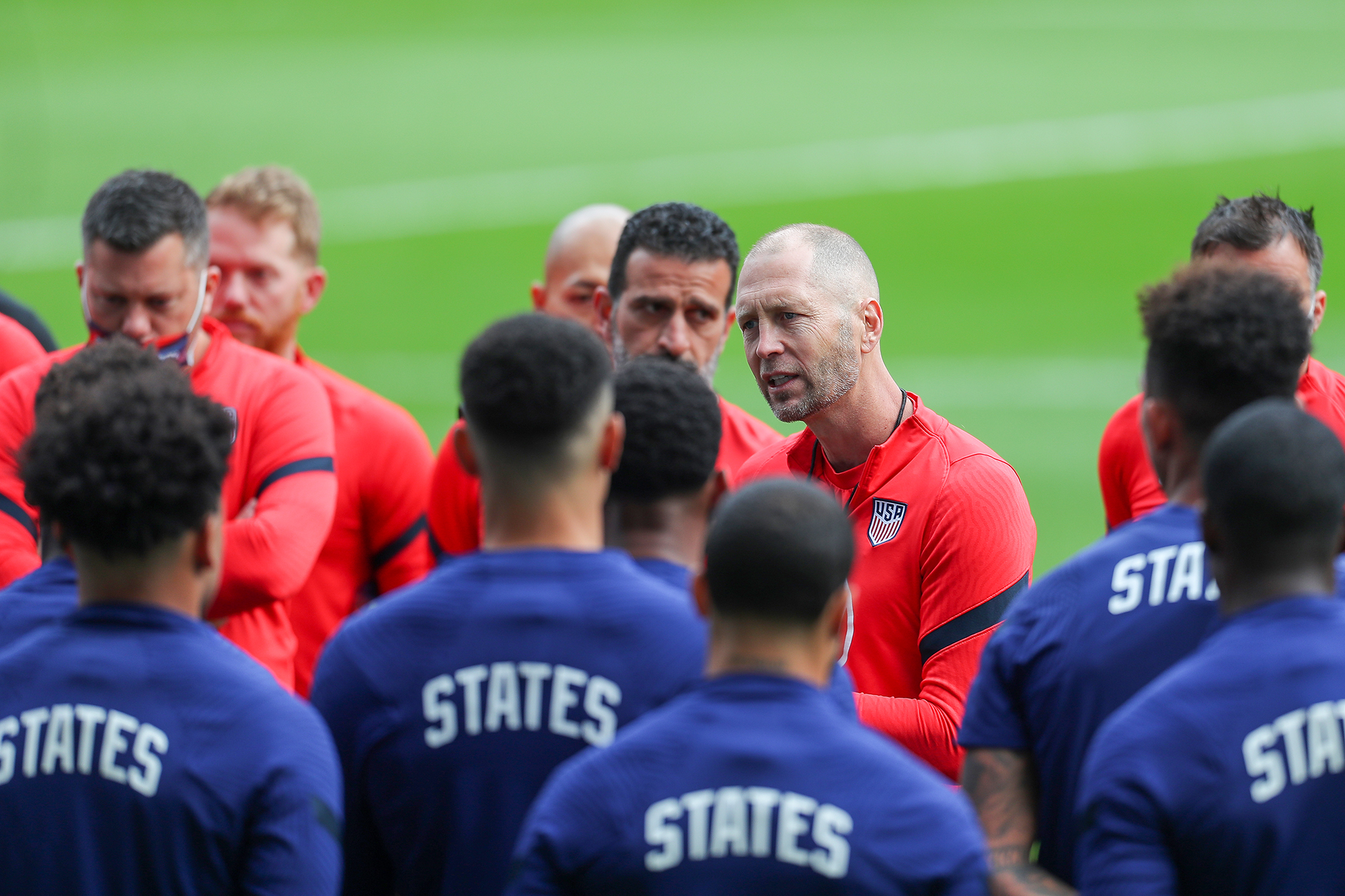Feeling the Blues at Chelsea, Can the U.S.’s Top Star Rise?
Adam Aminoff was hard to miss. It was a crisp early October afternoon in London, and we were at a massive sports bar directly across from the Victoria underground station, watching the North London Derby between Arsenal and Tottenham. The pub was packed, and Aminoff stood out among the crowd. He was dressed like an old English golfer—knickers with high socks, a waistcoat and tie, a jaunty cap and all of it, head to toe, brown plaid. It was a hell of a look. It was his bachelor party, which might have explained why he was dressed that way. Or maybe he just likes to get a good fit off while having a couple of pints. I didn’t want to ask and ruin the vibe.
We spent a lot of time talking about Chelsea. He’s been a season-ticket holder for 20 years. When I pressed for his take on Christian Pulisic—the embattled American who was buried on the bench for much of the season under former manager Thomas Tuchel, before Tuchel was sacked and replaced by Graham Potter—I heard one of Aminoff’s friends groan. Possibly because I was an American asking about an American, possibly because Pulisic hasn’t exactly distinguished himself during his time at Stamford Bridge. Possibly both.
“For the Premier League, I think he’s a little lightweight,” Aminoff told me, proceeding to rattle off a host of Pulisic’s deficiencies as he saw it. Not big enough. Not strong enough. Not fast enough. Not consistent enough. Aminoff conceded that Pulisic has talent, but as far as playing football “at the elite level,” he thought Americans in general, and that one in specific, were “still a little bit far off the standard of the Premier League.”

The remarks weren’t so much biting as casual and dismissive, as though the topic wasn’t worth expending much energy on. Before that afternoon, when Chelsea was set to face Crystal Palace, Pulisic had appeared in six Premier League games this season, starting just one, for a grand total of 156 minutes. Pulisic once again sat on the bench for much of that match at Selhurst Park before coming on for Mason Mount in the 84th minute. It looked like it would be another wasted fixture in a series of them for Pulisic—until he delivered a brilliant assist on a Conor Gallagher goal in the 90th minute to push Chelsea past Palace 2–1.
It was one of the better performances for the biggest and most recognizable American name in soccer, which isn’t exactly saying a lot. Assist aside, Pulisic played all of six minutes against Palace. The Champions League match just a few days later at home against AC Milan proved a bigger indignity. It was a raucous night, with charged-up, marauding Milan fans marching to the game and laying waste to the streets of Kensington—they left a wide trail of smashed beer bottles, empty cans and cigarette butts behind them—but nary a peep was heard from Pulisic in Chelsea’s 3–0 win; he never got off the bench. Something tells me he wasn’t singing along when the crowd rocked out to “One Step Beyond” after the victory.
I watched that game at an Earl’s Court pub overrun with Chelsea fans. They were in good spirits for obvious reasons. Among them were a handful of electricians having a few pints after a long day. One was named Kane Tonner, and when I asked why Pulisic was not playing, again, even with a comfortable lead, his brother Brandon blurted out the answer on his behalf: “He’s American.” I’m sure I’ve laughed that hard before, but it’s hard to remember when.
The Brits love dunking on Pulisic—even when things go well for him, which has been admittedly rare of late. Pulisic started against Wolves a few days after he went MIA against Milan, played 72 minutes and scored a goal after a brilliant bit of give-and-go with Mason Mount. It was easily his best outing in ages, and the only time he’s found the back of the net in 11 matches so far for Chelsea this season.
And yet on BBC One’s Match of the Day later that evening, the presenters couldn’t help themselves and essentially said “He’s complained a lot, but look at him now!” I’m paraphrasing, but the summary isn’t far off. When it comes to Pulisic, it feels like the whole country loves having a laugh. The English may have spent the fall with a head of lettuce for prime minister and their currency tanking like it had a shot at Victor Wembanyama, but at least they’ll always have American soccer to look down on—and potentially kick around, since England and the U.S. are grouped together at the World Cup, much to the Brits’ delight, and will face each other the day after Thanksgiving. For a wobbly USMNT side to get out of the group or have a prayer of taming the Three Lions, it’ll need Pulisic to prove the detractors in his adopted country wrong—about U.S. football, and especially about himself.

In truth, Pulisic and the USMNT have been easy to pick on of late. Across all competitions this season, including for the U.S. national team, Pulisic has started and played more than 60 minutes just four times—the aforementioned Wolves match, a Champions League victory over RB Salzburg (he notched an assist), a Premier League loss to Brighton and a 0–0 friendly/World Cup warmup against Saudi Arabia where he was on the pitch for 75 minutes before USMNT coach Gregg Berhalter swapped him out for Malik Tillman. The scoreless draw against the Saudis was somehow an improvement over the previous game, a 2–0 loss to Japan that Pulisic sat out. In 180 minutes of the last soccer it’ll play before the World Cup in Qatar, the USMNT mustered just two shots on goal and had a minuscule 0.28 in expected goals.
That’s the kind of effort, or rather lack of one, that prompted some of the biggest voices in the sport to sound the alarm. Men in Blazers said it was “depressed” about the team’s form heading into a long-awaited World Cup for the first time in eight years and called the USMNT a “hot mess.” Alexi Lalas, a former USMNT star and Fox Sports lead studio analyst for FIFA World Cup Qatar 2022, described the effort against the Saudis as “uninspiring” and “unflattering.” And soccer commentator Max Bretos, who also calls LAFC games, was so defeated that he said there was nothing to be excited about heading into the World Cup, other than the mere fact that the USMNT will be there. Ouch.
As Berhalter put it after the Saudi draw, “It’s nervy times.” Indeed—for the overall team and particularly America’s biggest star. Bretos lamented that Pulisic’s troubles at Chelsea—a club that he was reportedly hopeful to leave before the transfer window slammed shut in September—had “diminished” him, and “it’s clearly entered the national team space.” Premier League player turned CBS analyst Nigel Reo-Coker said much the same thing about Pulisic’s lack of playing time. A cursory search of “Christian Pulisic” after the Saudi match revealed headlines that were hardly complimentary, including The Daily Mail, being The Daily Mail, quoting former MLS-er Brian Dunseth in one blaring “Pulisic ‘cannot be trusted’ and is not the ‘focal point’ of the USMNT” and “‘Captain America’ is overhyped.” And after Pulisic didn’t play a minute in the Blues’ consecutive road wins over Milan and Aston Villa, ESPN FC openly asked, is “Pulisic to blame for lack of Chelsea minutes?”
In fairness to Pulisic, it’s easy to forget everything that got him to this point. He excelled at Dortmund, meriting the $73 million transfer fee to Chelsea, but since then he’s been nagged by injuries and has played for three different managers in four seasons. Part of the reason he can’t crack the lineup is that in July Chelsea paid a ransom for Raheem Sterling and plopped him in front of Pulisic. It should also be noted that Pulisic has had big goals for the USMNT since arriving at Stamford Bridge, and even a few big ones for Chelsea in a Champions League semifinal and FA Cup final.

Those types of dazzling moments have always tantalized American fans dreaming of the U.S.’s first great international superstar, but Pulisic hasn’t delivered them consistently enough to make that hope a reality. There’s a bit of a chicken-and-egg scenario to his career at the moment. Is he not playing much for Chelsea because he hasn’t performed well, or has he not performed well because he’s not playing?
As Lalas told me when I put the question to him, “It is multiple cycles where a coach has assessed him and come to the conclusion that he’s not a regular starter. That doesn’t mean he can’t be valuable, and it doesn’t mean they don’t want him there. I think that would be concerning because someone of his ability and of his aspiration wants to be in a place where he’s starting. I would think that they are absolutely looking at a move come January, and there are all sorts of rumors.”
The latest gossip has Leeds United, Newcastle, AC Milan and Juventus being potentially interested in breaking Pulisic out of his Stamford Bridge prison. In the interim, the USMNT will head into the World Cup with a star player who, unless something drastic changes, will prepare for the international spotlight while remaining in his club’s shadows. That’s hardly ideal, though. Lalas had an interesting way of assessing Pulisic’s predicament. He said, naturally, “You want your players playing consistently and you want them playing well.” But he also believes that “a lot of times, form is fallacy” and that just because things aren’t going well for Pulisic at Stamford Bridge doesn’t necessarily mean the same will be true in Qatar.
“There’s probably not going to be anyone more excited to step on that plane and go to Qatar than Christian Pulisic is,” Lalas said. “It is maybe a welcome change of scenery. And he’s going back to a team and a cocoon, if you will, that’s very warm and welcoming to him. This could be a magical type of bubble that brings out the best in him because he’s more comfortable and more confident, and away from some of the criticism and the pressure, and most importantly, just the circumstances and situation that Chelsea is right now.”
Hard to argue—though leaving Stamford Bridge behind is a different proposition than getting away from the pressure.

Pulisic and pressure are intertwined these days. Maybe they always have been. Bring up one in the context of the USMNT and the approaching World Cup, and the other will invariably be mentioned. It’s unavoidable, though maybe it shouldn’t be. This American side is young and inexperienced, but it’s also talented (on paper). There are guys like Brenden Aaronson and Tyler Adams logging big minutes in the Premier League for Leeds United and showing, as Aaronson insisted, that “Americans can play football too.” Of course, if you have to say so in the first place it probably undercuts your argument. But the point here is that there are other names to theoretically help with the heavy lifting—Tim Weah, the ever-injured Gio Reyna, the wildly inconsistent Sergiño Dest—so why has the conversation around the USMNT usually been so singularly focused on just one name?
“He probably feels an enormous amount of pressure,” Heath Pearce, a USMNT defender turned CBS soccer commentator, told me. “If you go back to the 2018 cycle, there was a lot of pressure on a few people to be the ones that delivered. … Now there’s this realization that, oh, I don’t have to do too much. I’ve got guys playing around me at big clubs in high-pressure situations that can also score big goals and do other things. And they’re all young and we’re going through this together.
“In the past, he probably felt, It’s all on me. I am the player of this generation that has to carry this whole thing forward by myself. Which was made, by and large, by all of us. Not by him.”
Whether or not that last part is true—that the pressure and weighty expectations have been a creation of the media and the fans—Pulisic has lately addressed the issues head-on. He wrote a book titled Pulisic: My Journey So Far. Putting aside the massive footballs it takes to write a memoir at 24 (how many chapters could it possibly have?), the book evidently details his disagreements with Tuchel over playing time and how he was “dumbfounded” over it. That revelation came not long after Chelsea fired Tuchel, which means there’s an alternate universe where the player who just wrote about not liking how his manager handled him is still sharing a locker room with said coach, which would have been awkward and uncomfortable at the least. But if that wasn’t direct enough, Pulisic also stars in a new World Cup commercial with an on-the-nose message that’s impossible to miss.
Not only does the spot overuse the word “pressure,” but it literally puts Pulisic on the couch in a therapist’s office and has him unpack his childhood. (Throwing Roy Kent in was a nice touch, too. Get that bag, Brett Goldstein.) It represents fairly remarkable candor, especially given that Pulisic is famously unforthcoming and not known for giving many interviews. (Multiple requests sent to Chelsea seeking to interview Pulisic received no reply.) And yet there he is on TV, putting his feelings on public display for a payday.
“I thought a lot about that, seeing that commercial and wondering what’s going through his head when that was pitched to him,” Stu Holden said. He’s the lead match analyst for Fox Sports coverage of FIFA World Cup Qatar 2022 and a former USMNT midfielder who played in the 2010 World Cup in South Africa. Like me, it struck Holden that America’s top soccer star was being openly vulnerable and essentially admitting that he’s been consumed by the pressure. It’s hard to picture other big name players doing the same. Imagine Cristiano Ronaldo filming a spot about getting older and being marginalized as his career comes to a close. You can’t because he wouldn’t. He’d sooner just walk away. “You put yourself in that situation where you’re letting people into what you’re genuinely feeling. I think when that was pitched to him, he doesn’t agree to it if he doesn’t feel that way. I think he feels that pressure, he feels the expectations,” Holden said.

“But believe it, there’s probably going to be those moments in the World Cup where there’s a penalty, a free kick, a big-time situation where the U.S. is going to need him to dig one out.”
Which is exactly how the commercial ends, with Pulisic playing the hero. Maybe he will have a Hollywood moment in Qatar, but for that to happen he’ll have to somehow reemerge as the U.S.’s leading man while remaining little more than a marginalized understudy at Chelsea. That’s obviously not great for him or the USMNT, and it presents quite a few challenges—for the player and his manager. Pulisic is tasked with getting himself ready to be on the pitch in late November without having been on it all that much in the months before.
It’s also no simple task for Berhalter, who has his own set of unique complications here. For the U.S. to have a memorable and meaningful trip to Qatar and not just an abbreviated layover in the Middle East, Pulisic has to be at his best. As Lalas said,“When Christian Pulisic plays well, the U.S. team does well, in my expert opinion. I’m not going out on a limb saying that. It is simple, but it is true.” So how much weight does Berhalter trust Pulisic to carry? How many minutes can he wring out of someone who hasn’t played all that much, and what kind of quality will he get in return for those minutes? That’s one set of difficult decisions all on its own.
Barring something unforeseen, between Pulisic, Aaronson, Reyna and Weah, someone likely isn’t starting. What, if anything, the USMNT gets out of Reyna remains a mystery. He’s spent much of the last year dealing with injuries, including a hamstring tear in a Bundesliga match in April that kept him out for months. Prior to that, Reyna missed most of the team’s World Cup qualifiers and played just 193 minutes during them. And against Saudi Arabia, Reyna was in the game for only 30 minutes before Berhalter yanked him. The manager called the move “precautionary” after the match, but judging by the ensuing Twitter conversation there aren’t too many people who are optimistic about Reyna being fit enough to log heavy minutes in Qatar. When Berhalter said these are nervy times for the team, he wasn’t kidding.
Every team will have hard choices to make, but it seems that Berhalter’s are especially dicey. During a February World Cup qualifier in St. Paul against Honduras, Berhalter didn’t start Pulisic, instead opting to bring him off the bench. Pulisic scored and the move worked out, but the optics of sitting your supposed-to-be star made people notice. But that was only a qualifier. The stakes weren’t nearly as high as they’ll be in Qatar. Surely Berhalter wouldn’t put Pulisic on the bench in the World Cup—right?
“No,” Holden replied when I asked, “for a World Cup that would be nuts.” Then he paused and thought about it for a second. He considered that maybe if Reyna and Weah were “scoring a ton of goals,” perhaps Berhalter would consider it, before ultimately sticking with everyone’s agreed-upon position that for the U.S. to go anywhere (or even just get out of the group), Pulisic probably has to be leading the way or at least helping punch coordinates into Google maps. Followers of the USMNT no doubt hope that Pulisic returns to form, while followers of Chelsea and the Three Lions would probably say that’s all it is—hope. Either way, the takeaway is the same: the Americans need Pulisic to perform as much as he needs it for himself.
For his part, Pulisic seems to sense that there’s heightened anxiety with regard to his far-from-ideal club situation potentially impacting the USMNT in Qatar. After the Saudi Arabia match, he said the Americans have to do everything possible “to prepare your body physically, mentally, as best you can to be prepared once that time comes.” That obviously applies to Pulisic above all, as does one other thing he mentioned, which might have been the most candid admission he could make—aside from lying on a therapist’s couch and talking about pressure in a commercial. Because there’s no customary extended training camp ahead of the World Cup this time around, and because so many of the players are scattered around the globe playing for clubs before they play for their country, it means much of the USMNT roster is on its own as far as preparation goes. The way Pulisic saw it, that means “It's everyone for themselves in a sense.” In another sense, it means the only one who can get Christian Pulisic going again is Christian Pulisic.
More Soccer Coverage:
